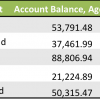How to Save When You Don’t Have Earned Income
 For those of us without earned income, the standard retirement advice does not apply. Not only do our workplaces (if we even have them) not provide retirement plans, but we’re locked out of contributing to IRAs. Assuming we’re making enough money to be able to save, how can we advance our goals?
For those of us without earned income, the standard retirement advice does not apply. Not only do our workplaces (if we even have them) not provide retirement plans, but we’re locked out of contributing to IRAs. Assuming we’re making enough money to be able to save, how can we advance our goals?
1) Evaluate your financial situation holistically.
Not everyone needs to save for retirement at all times. There are other legitimate savings goals that you can supercharge while you don’t have access to tax-advantaged retirement accounts. Here are some other good uses of your money:
- build a sizeable emergency fund (6 months of expenses, give or take a few)
- pay down high-interest debt (or all debt)
- save for a 20% house downpayment to avoid PMI if you plan to buy a house soon, or pay down your mortgage faster if you already own one
- save for your next large purchase for which you would normally take out a loan (e.g. a car)
If your non-earned income is a temporary situation, I think it would be advisable to advance these other areas of your financial life so that you can easily catch up with retirement when you have earned income.
2) Earn some income.
Get Married: Just because your primary job doesn’t give you earned income doesn’t mean you can’t obtain it other ways. The easiest? Marry someone with enough earned income to cover you both! (I’m just kidding. Marriage isn’t easy. But it is straightforward). Your spouse can contribute to an IRA on your behalf.
Take a second job: If you’re determined to utilize a tax-advantaged retirement account, you could take a part-time job to supplement your income. You only need to earn an extra $5,000 to max out an IRA. My contract at graduate school precludes me from having another job, but some departments expect their students to supplement their stipends. Permitted students (and some who aren’t) will pick up an outside job, and as long as you are paid with a W-2 or similar all of that extra income could go into an IRA.
Switch up your work: Even if you can’t take on a second job, can you switch up your funding source at all for part of the year to gain earned income? Can you do a summer internship? Can you secure a teaching or research assistantship for a semester for which you are explicitly paid?
3) Save outside tax-advantaged retirement accounts.
Even though we know that it’s preferable to save in a tax-advantaged account because you don’t have to pay taxes yearly on earnings, there are other account types that you can save in. Of course there are savings accounts, CDs, and money market accounts. You will have to pay taxes on the interest you earn every year, and the interest rate probably won’t beat inflation.
You can also open a brokerage account and buy into index funds, mutual funds, ETFs, and individual stocks. You will owe taxes on the amount of gains you realize when stocks are sold. In the case of an individual stock, you only pay the tax in the year that you sell it, so if you hold on to it for years and years that will minimize your tax burden. The same logic applies for mutual funds. At the end of each year the fund will have a net gain (hopefully) so they will give you a distribution, on which you have to pay tax, even if you reinvest it. Index funds, which more closely replicate the buy-and-hold strategy, will minimize the taxes you owe yearly.
Once you have access to tax-advantaged retirement accounts, you can add these savings to those accounts if you’re under the limits. Or you can keep the money more flexible for other savings goals.
I hope that if you do go through a period of not having earned income it’s only for a limited time and that you do have other worthwhile goals to which you can contribute in the meantime.
What goals would you work toward if you couldn’t use tax-advantaged retirement accounts and what vehicles would you use?
photo by 401K
Filed under: retirement · Tags: brokerage account, earned income, house, mutual funds, retirement, savings

 Can a Net Income Boost Compensate for Not Having Earned Income?
Can a Net Income Boost Compensate for Not Having Earned Income? Earned Income: The Bane of the Graduate Student’s Roth IRA
Earned Income: The Bane of the Graduate Student’s Roth IRA Why You Should Save for Retirement While In Graduate School Part 2
Why You Should Save for Retirement While In Graduate School Part 2 Why You Should Save for Retirement While In Graduate School Part 1
Why You Should Save for Retirement While In Graduate School Part 1


Can you not contribute to retirement in the states unless you work? I don’t think that’s the way it is in Canada, but I could be wrong. I’d just keep saving away anyway. While RSPs in Canada are probably one of the better interest rates, there are some decent rates out there other than those, so I guess I’d just find one of them!
Daisy recently posted..Taking Care of Clothes
Tax-advantaged retirement accounts are only available to people with earned income – that was the subject of my post on Tuesday.
Great area to focus on Emily! I’ve never really thought about this situation.
For starters, if the couple has enough money to cover their basis expenses, they have to be earning it somehow…so I’m going to assume that one spouse is working and the other is laid off: well, you can open a spousal Roth IRA (or IRA) and both can make Roth IRA contributions even though one isn’t working.
If they are both unemployed and covering their basic necessities via unemployment checks then that is a different conversation.
If the unemployment was a short-term thing then I really like your ideas you described at the beginning. If it’s a long-term thing though I would look at contributing to the Brokerage account and get some compound interest in my life to work in my favor.
WorkSaveLive recently posted..Carnivals, Mentions, & Weekend Reading #5
I agree with you in the case of unemployment, but I was really speaking to the 1099/not-earned-income situation that I wrote about last Tuesday. I guess I didn’t make that clear in the introduction to the post.
If you don’t want to use traditional retirement accounts, the next thing I’d look into would be dividend stocks. Dividends are classically taxed lower than normal standard income (15% I believe is the max), so you’d be paying less on the income you get from them than say from capital gains, etc. I just bought my first dividend stocks recently. It was PRETTY easy to do.
MyMoneyDesign recently posted..How I Got My Alexa Ranking Below 200,000
Thanks for adding this. I didn’t realize dividends were taxed lower than income taxes. We have some dividend mutual funds right now in our brokerage account, but we’re in the 15% tax bracket so maybe that’s why we didn’t notice the rate difference.
The problem with taking a second job in order to have earned income to invest in an IRA: There are lower income limits as well. In 2009, my wife and I had to file seperately and I only had ~$9000 of income. I wound up getting a penalty for over-contributing to my Roth! And I contributed something in the area of $150 that year.
Edward Antrobus recently posted..Why I Love My IRA: A Roth IRA Movement Post
Can you provide an IRS reference for that rule? I have never heard of income minimums for Roths aside from the earned income issue and I don’t see it in Publication 590. I know that there is a $10,000 maximum on married filing separately living together but it sounds like that shouldn’t have applied in your case. Are you sure you had earned income?
So if I don’t have any earned income and I want to save money, I should earn some income as point #2 states. This seems a bit contradictory to the point of the article?
Mike@Investing in Silver recently posted..Mexican Silver Libertads
I was assuming that at least some people in that situation would have the option of taking a second job. Personally, I’m not allowed to have an second job. However, many graduate programs do not pay a living wage and the students are expected to take outside part-time jobs to make ends meet. My point there is that perhaps instead of making money through a non-earned route – like doing clinical studies, for instance, which was very popular at my last job – the person should seek a part-time job that pays with a W-2.
[…] In my next post I will suggest ways that graduate students being paid with 1099-MISCs can save for the future despite their lack of earned income. […]
[…] interest and miscellaneous softer arguments. If you’re stuck with a 1099-MISC, there are a few other strategies you could use if you are determined to […]
Assuming a graduate student paid on a 1099 with no earned income, can savings invested in a taxable brokerage account be later converted to tax-advantaged space? In other words, can I, after graduation and acceptance of a real job, convert my taxable brokerage holdings to a ROTH or ROTH 401k? Or could I convert to a 401k, then roll them over to a Roth? I ask because I see taxable brokerage holdings as a last resort, and one that I want to move out of ASAP.
I don’t think there is a “conversion” available (the way you can convert a traditional IRA to a Roth, for instance). I think your best option would be to use the money saved during grad school to quickly fund an IRA and schedule your 401(k) to be maxed out (or a self-employment retirement plan, if applicable) while drawing down your savings as soon as you can after grad school. If you were already going to max both out with your first Real Job, I don’t know of another way to get the taxable money into a tax-advantaged account. But I’m not a financial advisor so I don’t know for sure! You might also be interested in Cash Rebel’s recent article on capital gains taxes. I know we’re currently paying 0% tax on the money in our taxable accounts, so if your tax rate stays low enough for long enough it might be better to stay in taxable accounts. So it’s not a bad option if you’re in the 15% income tax bracket.
[…] student finances, by evolvingpf is really the appropriate person for this question. Here’s her answer from 2012 on her original website. Her answers are what I first thought as […]
So, something I am not finding really addressed anywhere. I have non-taxable income. I am on disability from the VA for military service and I have tenuous Social Security Disability that is subject to the whims of a judge deciding whether or not they decide this time around that they think that my doctors are qualified to render my diagnoses and treatments this time or not, losing me 33k or suspending 10s of thousands of dollars for many years at a time. So people like me need a way to sensibly invest, but are not finding any resources that tell us much of anything outside of traditional standards for the usual retirement options of retirement people working wage and taxes. When I don’t have an income, taxably reportable, I cannot contribute to IRAs. And when I cannot invest my income, then the SSA can take all of the money I have saved up for that house I was about to buy after 5 years of saving after 3 years of review because a judge was going particularly hard liner against allowing people to retain their SSD benefits. They obviously cannot take the money from me if it is tied up while I await the appeals courts, but if it is loose, I lose the money and become trapped for the next couple years and cannot even use the money to work towards my future at the paltry savings interest rates in my savings accounts. So finding information that allows, regardless of the mercurial nature of the SSA judges, it would be a godsend to those of us disabled and needing a better way for our lives but struggling to educate ourselves effectively due to our disabilities, such as in my case severe pain and brain fog during severe flare ups that happen frequently.
Thank you.